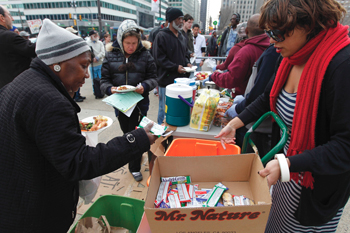By Charlene Muhammad CHARLENEM

(FinalCall.com) – The fight to feed America’s homeless is escalating, leaving charitable individuals and groups wondering what will happen to the poor and hungry?
At least 71 cities have enacted bans on food sharing or restricting how good samaritans distribute food to the homeless in public places like parks and beaches, but matters could get worse if a judge in Fort Lauderdale, Fla. rules this month against 91-year-old Arnold Abbott, founder of the volunteer organization, Love Thy Neighbor, who faces $1,500 in fines and up to 180 days in jail for defying the city’s laws on feeding the homeless.
Advocates say Fort Lauderdale’s law requiring in part a permit to feed the homeless targets them, is unconstitutional and they are closely monitoring lawsuits filed by Mr. Abbott and Pastor Mark Sims of St. Mary Magdalene Episcopal Church in Coral Springs. Pastor Sims and Dwayne Black, pastor of The Sanctuary Church in Fort Lauderdale were also arrested and charged on Nov. 2.
Cities enacting the bans say they are concerned about food handling issues and a lack of restrooms among other public safety issues.
“If they’re really honest, their real purpose for enacting such laws is to make the homeless population either go away or make the population less visible,” said Michael Stoops, director of Community Organizing for the National Coalition for the Homeless. The organization advocates, litigates and lobbies for rights of America’s homeless population, which is increasing every year.
According to its October 2014 report, “Share No More: The Criminalization of Efforts to Feed People in Need,” authored by Mr. Stoops, 83 percent (19 of 25) cities surveyed by the United States Conference of Mayors in 2013, reported a rise in the number of emergency food requests from 2012.
Ninety-one percent reported an increase in persons requesting food assistance for the first time, and 80 percent reported an increase in frequency of visit to food pantries and emergency kitchens each month.
Seventy-eight percent reported they’ve had to reduce the number of times people could visit food pantries each month, and 66 percent of the cities have had to turn people away due to a lack of resources.
The number one cause of homelessness in America is the lack of affordable housing that’s affecting homeless, middle class and working class alike, followed by the lack of health insurance, being remedied somewhat by the Affordable Care Act, and either underemployment or unemployment, Mr. Stoops, told the Final Call.
“I think the American people all at once are going to have to say we can’t have so much poverty in this country, and homelessness is probably the most extreme form of poverty,” he said.
Since Mr. Abbot and Pastors Sims and Black were arrested Nov. 2, Mr. Stoops said he’s receiving calls and emails from people concerned they’ll be arrested if they share food with the homeless. Working and middle class people want to help but not at the risk of going to jail or being fined, and that’s the bad effect of the anti-food sharing law, he said.
“We’re hoping that we can win those lawsuits, and that will send a message to cities around the country. If you do this, then you’re going to be sued and it will hurt them in their own pocketbook,” he told The Final Call.
He noted he’s never seen a city adopt so many laws over such a short period of time and that’s why it’s important for people to fight the criminalization of the homeless and particularly the ordinances coming out of Florida.
Up until this controversy, Mr. Stoops said, he would have cited Fort Lauderdale as a good example of cities that outreach to the poor, because it has good programs and shelters helping the homeless. However, complaints to the city council from tourists and regular businesses about the homeless and poor increased.
“I think the real war that’s going on is between downtown America, whether it’s Los Angeles or Fort Lauderdale or Washington, D.C. There’s a polarization happening between the interests of economic development and tourism versus agencies serving the homeless and homeless people themselves, and cities just want to drive the homeless out of the downtown area,” Mr. Stoops said.
The results of hiding the homeless could be deadly, activists say. Without adequate nutrition, according to “Share No More,” people may suffer extreme medical problems, which include anemia, dental problems, gastric ulcers, cardiovascular disease, hypertension, acute and chronic infectious diseases, and diabetes.
“General Jeff,” who advocates for men, women and children who either live, congregate or wander within Skid Row–the 52-block area of downtown Los Angeles considered the “homeless capitol of America”– labeled the food sharing bans and restrictions anti-human evolution.
“It perplexes the mind to hear of coordinated methods to ‘legally’ deny a person from merely helping someone whom is less fortunate than they are. Just as it was once ‘legal’ to own slaves in this country, it cannot (and should not) be tolerated by anyone for a law to be created which deems it illegal to assist another human being,” he said.












